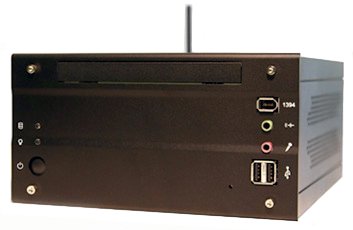Device Profile: Box Populi Podcast in a Box
Oct 9, 2006 — by LinuxDevices Staff — from the LinuxDevices Archive — 2 views Box Populi, formerly “Webcast in a box,” has used Linux to create a podcast capture appliance aimed at corporations, schools, radio stations, and churches. The “Podcast in a Box” (PIAB) appliance records when a USB key is inserted, uploading to a server upon key removal.
Box Populi, formerly “Webcast in a box,” has used Linux to create a podcast capture appliance aimed at corporations, schools, radio stations, and churches. The “Podcast in a Box” (PIAB) appliance records when a USB key is inserted, uploading to a server upon key removal.

Box Populi's “Podcast in a Box”
digg this story |
Startup Box Populi, based in Portland, Ore., was co-founded by two former employees of streaming media specialist RealNetworks. It currently has five employees.
Co-founder and CTO Chris Dawson says the company's name is meant to evoke “vox populi,” Latin for “voice of the people.” Dawson said, “We believe that everyone should have a voice in public discourse, not just those who own television towers.”
The PIAB aims to make podcasting as simple as possible. Recording begins when a special USB key is inserted, and stops when the key is removed. The recording is compressed into the widely supported MP3 format.
Alternatively, recording can be initiated or scheduled using a secure browser interface, or through a GNOME-based graphical user interface accessible when an optional monitor, mouse, and keyboard are connected.
 Box Populi Media Server (Click to enlarge) |
The PIAB can be configured to automatically upload completed podcasts to a web or streaming media server, such as Box Populi's “Media Server” product (pictured at right), a 1U rackmount unit currently in development. The PIAB can also be configured to notify subscribers via email about newly published podcasts.
Box Populi also operates a “Meedu” hosting system marketed to large universities, such as UC San Diego. Meedu features an open architecture aimed at facilitating a worldwide academic community, according to Dawson, who recently blogged about the dangers posed to the academic community by Apple's proprietary podcast formats. Dawson said, “We think losing educational content within closed services would be a loss. This service aims to provide an open alternative.”
Dawson adds, “Our appliances are generally either completely open source, or have large portions of the source code available as open source components. We always ship 100 percent of source code for our appliances on the appliances itself, though the license may not allow redistribution in certain cases. In some cases this is because we have to pay a license fee to utilize certain code (like MP3 encoders) to another third party.”
What's under the hood?
The PIAB is based on a mini-ITX motherboard powered by a 1.3GHz x86-compatible Via processor and equipped with 256MB of SDRAM and an 80GB hard drive. Audio is supplied by an onboard Intel audio chipset. The system is housed in an off-the-shelf mini-ITX case from Travla.
Key I/O includes line- and microphone-level audio inputs, four USB ports, and a firewire port “that we don't use,” Dawson said.
On the software side, the PIAB is currently based on the “Hoary Hedgehog” release of Ubuntu Linux, with a “Dapper Duck” live/installer CD image in the works. In addition, the PIAB uses a variety of open-source software packages, including icecast, darkice, perl, and ruby-on-rails. “We do as much as possible in 'agile' programming environments,” Dawson said.
Additionally, the PIAB is available as a software-only ISO image download, which can be run directly from the CD or installed to the system's hard drive. Minimum requirements are a P-III running at 500MHz, with 128MB of RAM.
Dawson said, “In the spirit of our commitment to democratization of media, we have provided many users with the same exact software running on top of a recycled PC. Often we use PCs from our local PC recycling group, FreeGeek. A box they donated to us is used by several programmer user groups here in Portland, including the Portland Perl Mongers and the Portland Rubyists.”
Asked about his company's use of Linux, Dawson replied, “As a small company you feel like you have a support staff of thousands when you involve yourself in the Linux community. The Ubuntu community is the greatest Linux community in the world, and I've been a part of almost all of the large ones. I don't see this spirit in the Windows world. I would strongly recommend anyone consider Linux as a foundation for software and hardware appliances.”
Availability
PIAB has been available for about two years, priced at $2,000. Alternatively, it can be obtained for free as a live/installer ISO from the Box Populi website.
Additionally, an all-in-one webcast-in-a-box product is available, priced at $9,000. It seems to integrate the capabilities of the PIAB with those of the currently beta-testing media server.
This article was originally published on LinuxDevices.com and has been donated to the open source community by QuinStreet Inc. Please visit LinuxToday.com for up-to-date news and articles about Linux and open source.